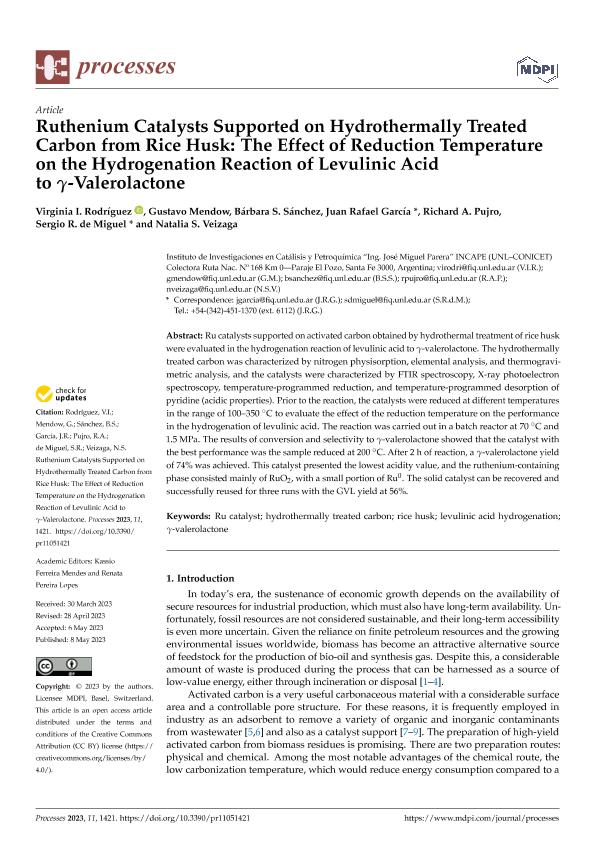Mostrar el registro sencillo del ítem
dc.contributor.author
Rodriguez, Virginia Ines

dc.contributor.author
Mendow, Gustavo

dc.contributor.author
Sanchez, Barbara Sabrina

dc.contributor.author
García, Juan Rafael

dc.contributor.author
Pujro Tarquino, Richard Alfonzo

dc.contributor.author
de Miguel, Sergio Ruben

dc.contributor.author
Veizaga, Natalia Soledad

dc.date.available
2024-03-08T13:12:55Z
dc.date.issued
2023-05
dc.identifier.citation
Rodriguez, Virginia Ines; Mendow, Gustavo; Sanchez, Barbara Sabrina; García, Juan Rafael; Pujro Tarquino, Richard Alfonzo; et al.; Ruthenium Catalysts Supported on Hydrothermally Treated Carbon from Rice Husk: The Effect of Reduction Temperature on the Hydrogenation Reaction of Levulinic Acid to γ-Valerolactone; Multidisciplinary Digital Publishing Institute; Processes; 11; 5; 5-2023; 1-17
dc.identifier.uri
http://hdl.handle.net/11336/229837
dc.description.abstract
Ru catalysts supported on activated carbon obtained by hydrothermal treatment of rice husk were evaluated in the hydrogenation reaction of levulinic acid to g-valerolactone. The hydrothermally treated carbon was characterized by nitrogen physisorption, elemental analysis, and thermogravimetric analysis, and the catalysts were characterized by FTIR spectroscopy, X-ray photoelectron spectroscopy, temperature-programmed reduction, and temperature-programmed desorption of pyridine (acidic properties). Prior to the reaction, the catalysts were reduced at different temperatures in the range of 100–350 C to evaluate the effect of the reduction temperature on the performance in the hydrogenation of levulinic acid. The reaction was carried out in a batch reactor at 70 C and 1.5 MPa. The results of conversion and selectivity to g-valerolactone showed that the catalyst with the best performance was the sample reduced at 200 C. After 2 h of reaction, a g-valerolactone yieldof 74% was achieved. This catalyst presented the lowest acidity value, and the ruthenium-containing phase consisted mainly of RuO2, with a small portion of Ru0. The solid catalyst can be recovered and successfully reused for three runs with the GVL yield at 56%.
dc.format
application/pdf
dc.language.iso
eng
dc.publisher
Multidisciplinary Digital Publishing Institute
dc.rights
info:eu-repo/semantics/openAccess
dc.rights.uri
https://creativecommons.org/licenses/by/2.5/ar/
dc.subject
RU CATALYST
dc.subject
HYDROTHERMALLY TREATED CARBON
dc.subject
RICE HUSK
dc.subject
LEVULINIC ACID HYDROGENATION
dc.subject
GAMA-VALEROLACTONE
dc.subject.classification
Ingeniería de Procesos Químicos

dc.subject.classification
Ingeniería Química

dc.subject.classification
INGENIERÍAS Y TECNOLOGÍAS

dc.title
Ruthenium Catalysts Supported on Hydrothermally Treated Carbon from Rice Husk: The Effect of Reduction Temperature on the Hydrogenation Reaction of Levulinic Acid to γ-Valerolactone
dc.type
info:eu-repo/semantics/article
dc.type
info:ar-repo/semantics/artículo
dc.type
info:eu-repo/semantics/publishedVersion
dc.date.updated
2024-02-05T13:55:13Z
dc.identifier.eissn
2227-9717
dc.journal.volume
11
dc.journal.number
5
dc.journal.pagination
1-17
dc.journal.pais
Suiza

dc.journal.ciudad
Basilea
dc.description.fil
Fil: Rodriguez, Virginia Ines. Consejo Nacional de Investigaciones Científicas y Técnicas. Centro Científico Tecnológico Conicet - Santa Fe. Instituto de Investigaciones en Catálisis y Petroquímica "Ing. José Miguel Parera". Universidad Nacional del Litoral. Instituto de Investigaciones en Catálisis y Petroquímica "Ing. José Miguel Parera"; Argentina
dc.description.fil
Fil: Mendow, Gustavo. Consejo Nacional de Investigaciones Científicas y Técnicas. Centro Científico Tecnológico Conicet - Santa Fe. Instituto de Investigaciones en Catálisis y Petroquímica "Ing. José Miguel Parera". Universidad Nacional del Litoral. Instituto de Investigaciones en Catálisis y Petroquímica "Ing. José Miguel Parera"; Argentina
dc.description.fil
Fil: Sanchez, Barbara Sabrina. Consejo Nacional de Investigaciones Científicas y Técnicas. Centro Científico Tecnológico Conicet - Santa Fe. Instituto de Investigaciones en Catálisis y Petroquímica "Ing. José Miguel Parera". Universidad Nacional del Litoral. Instituto de Investigaciones en Catálisis y Petroquímica "Ing. José Miguel Parera"; Argentina
dc.description.fil
Fil: García, Juan Rafael. Consejo Nacional de Investigaciones Científicas y Técnicas. Centro Científico Tecnológico Conicet - Santa Fe. Instituto de Investigaciones en Catálisis y Petroquímica "Ing. José Miguel Parera". Universidad Nacional del Litoral. Instituto de Investigaciones en Catálisis y Petroquímica "Ing. José Miguel Parera"; Argentina
dc.description.fil
Fil: Pujro Tarquino, Richard Alfonzo. Consejo Nacional de Investigaciones Científicas y Técnicas. Centro Científico Tecnológico Conicet - Santa Fe. Instituto de Investigaciones en Catálisis y Petroquímica "Ing. José Miguel Parera". Universidad Nacional del Litoral. Instituto de Investigaciones en Catálisis y Petroquímica "Ing. José Miguel Parera"; Argentina
dc.description.fil
Fil: de Miguel, Sergio Ruben. Consejo Nacional de Investigaciones Científicas y Técnicas. Centro Científico Tecnológico Conicet - Santa Fe. Instituto de Investigaciones en Catálisis y Petroquímica "Ing. José Miguel Parera". Universidad Nacional del Litoral. Instituto de Investigaciones en Catálisis y Petroquímica "Ing. José Miguel Parera"; Argentina
dc.description.fil
Fil: Veizaga, Natalia Soledad. Consejo Nacional de Investigaciones Científicas y Técnicas. Centro Científico Tecnológico Conicet - Santa Fe. Instituto de Investigaciones en Catálisis y Petroquímica "Ing. José Miguel Parera". Universidad Nacional del Litoral. Instituto de Investigaciones en Catálisis y Petroquímica "Ing. José Miguel Parera"; Argentina
dc.journal.title
Processes
dc.relation.alternativeid
info:eu-repo/semantics/altIdentifier/url/https://www.mdpi.com/2227-9717/11/5/1421
dc.relation.alternativeid
info:eu-repo/semantics/altIdentifier/doi/https://doi.org/10.3390/pr11051421
Archivos asociados
